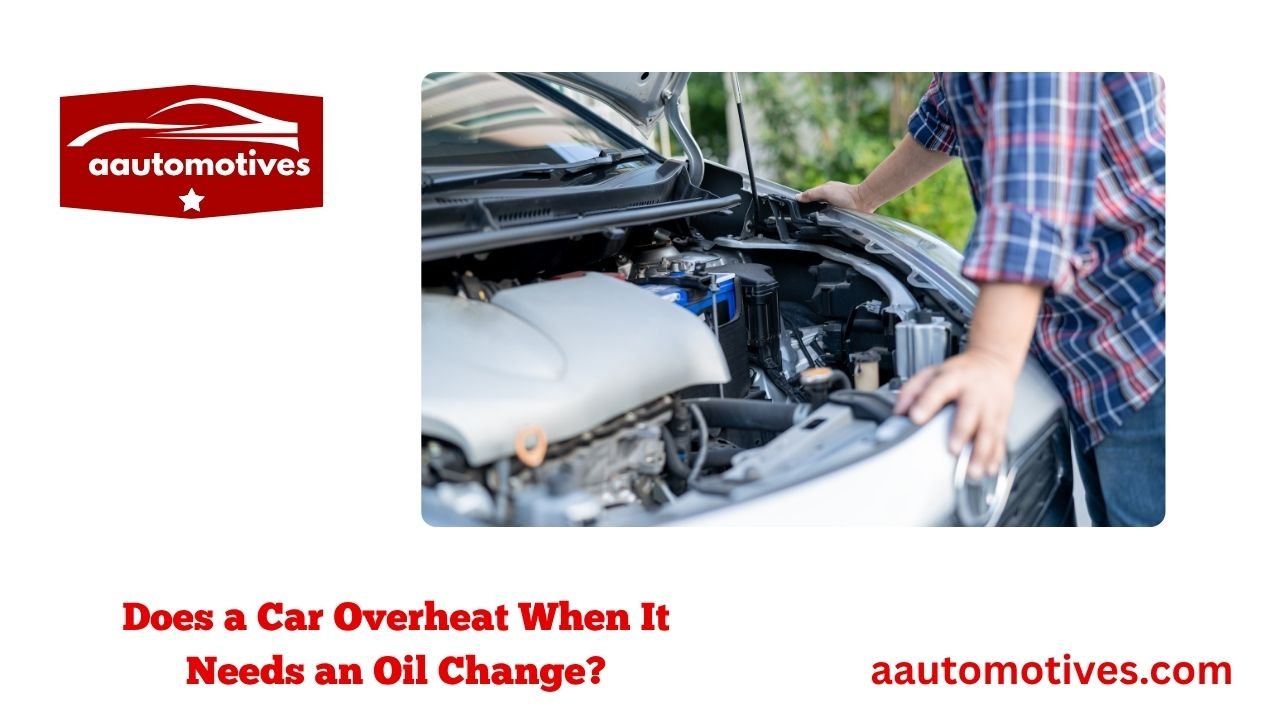Does a Car Overheat When It Needs an Oil Change?

Have you ever been stuck on the side of the road, steam pouring out from under your hood, wondering what went wrong? You’re not alone. Many drivers have faced this panic-inducing moment, only to later find out that something as basic as an oil change could be the culprit. So, let’s dive into that honest question that’s been bugging you: does a car overheat when it needs an oil change?
This might seem like a simple yes or no kind of thing, but the answer has layers. Like peeling an onion—except this one smells more like engine oil and burned rubber than kitchen tears. In this article, we’re going to unpack the real reasons cars overheat, how engine oil plays a role, and whether ignoring that oil change reminder could end up cooking your engine.
But don’t worry, we’ll keep it real—no mechanic jargon unless we break it down together.
The Role of Engine Oil: More Than Just Lubrication

Here’s what engine oil actually does:
-
Reduces friction: Less grinding means less heat.
-
Absorbs heat: Oil carries away excess heat from moving parts.
-
Cleans debris: It traps dirt, metal bits, and gunk.
-
Prevents corrosion: It adds a protective layer inside your engine.
Now, here’s the kicker. When your engine oil is old, dirty, or low, it doesn’t do these jobs very well anymore. So yes, when you delay an oil change, your engine doesn’t just run rough—it runs hot. That’s where the overheating comes in.
And here’s a little personal story. I once ignored my oil light for two weeks because life got busy (and okay, maybe I was being cheap). Big mistake. My car’s temperature gauge shot up on the freeway, and I ended up waiting two hours for a tow truck. Lesson learned. Does a car overheat when it needs an oil change? Mine sure did.
How Old Oil Contributes to Overheating: The Gritty Truth
Imagine trying to run a marathon in 100-degree weather while wearing a wool sweater. Sounds terrible, right? That’s kind of what your engine goes through when it’s running on old oil. The older the oil, the thicker and dirtier it gets. It turns into sludge. And sludge doesn’t flow well.
That sludge builds up and starts clogging oil passages, which means heat can’t escape. So the engine parts start heating up like a frying pan. Eventually, the cooling system can’t keep up, and boom—you’ve got an overheated engine.
Here’s a simple breakdown in table form:
| Condition | Fresh Oil | Old/Dirty Oil |
|---|---|---|
| Lubrication | Smooth and effective | Sluggish and patchy |
| Heat transfer | Efficient | Poor |
| Engine wear | Minimal | Increased |
| Overheating risk | Low | High |
So, is skipping an oil change once or twice going to blow up your engine? Probably not right away. But make a habit of it, and you’re slowly baking your engine from the inside out.
Main keyword alert: Yes, does a car overheat when it needs an oil change is a real concern—and now you know why.
What Happens Inside the Engine When Oil Gets Old?
Let’s break this down in a more personal way. Think of your engine as a team of workers on a factory floor. The oil is the air conditioning and the coffee—it keeps them moving smoothly and calmly. But what if the air con breaks down, and the coffee runs out?
Here’s what happens:
-
Metal parts grind together with more resistance.
-
This causes more friction, which means more heat.
-
The pistons and cylinders start to wear out faster.
-
The engine works harder, adding even more stress.
-
Without good oil flow, the cooling system is overloaded.
So when you delay your oil change, you’re basically sending your engine workers into overtime in a heatwave—with no fan and no break. Eventually, they’re going to break down.
That’s why mechanics always say that regular oil changes are the cheapest insurance for your car. And they’re right. A $50 oil change can prevent a $5,000 engine repair.
Signs Your Car May Be Overheating from Needing an Oil Change
Not all signs of overheating scream “oil problem!”—but some do. Pay close attention to these warning signs, because they often show up before the steam does:
-
Engine temperature gauge is creeping up
-
Burning oil smell inside or outside the car
-
Knocking or ticking sounds from the engine
-
Oil warning light flickers or stays on
-
Poor fuel efficiency
-
Sluggish performance, especially in hot weather
These are like your engine whispering, “Hey, I’m not feeling so great.” Don’t wait until it’s screaming with steam and smoke.
Here’s a quick reminder list to screenshot:
Red Flags That Your Car May Overheat Without an Oil Change
-
Oil looks dark, thick, or gritty on the dipstick
-
It’s been more than 5,000 miles since your last oil change
-
The engine feels hot even after a short drive
-
Frequent short trips (which wear oil faster)
-
Driving in hot climates or heavy traffic
When someone asks, “Does a car overheat when it needs an oil change?” these are the real-life signs to look out for. Don’t ignore them—your car’s literally sweating it out.
Why Skipping an Oil Change is Riskier in Hot Weather
Okay, let’s talk summer. That time of year when ice cream melts faster than your patience in traffic. Your engine feels that heat, too. Now picture that engine running with bad oil in 100°F weather. Not good.
Heat naturally makes oil thinner, which sounds nice but actually reduces its ability to protect the engine. And if the oil is already degraded, it won’t be able to handle the added stress. So everything inside the engine starts to get too hot, too fast.
In hot climates, you need your engine oil to be on its A-game. That means:
-
Changing it more frequently if you live in desert areas
-
Using the right viscosity (check your manual)
-
Avoiding cheap oil brands that break down quickly
Honestly, if you live somewhere like Arizona, Texas, or Southern California, skipping oil changes is almost asking for engine trouble. That’s why does a car overheat when it needs an oil change isn’t just a mechanic’s scare tactic—it’s a summer survival tip for your ride.
Other Hidden Links Between Overheating and Delayed Oil Changes
Sometimes, the overheating problem doesn’t just come from dirty oil—but from what dirty oil causes over time. Think of this like not brushing your teeth for months. Eventually, you don’t just have bad breath—you get cavities, gum disease, and worse.
Here’s what delayed oil changes might lead to:
-
Clogged oil filters: When filters get overwhelmed with dirt, oil can’t circulate properly.
-
Low oil pressure: This puts extra stress on the oil pump, which could cause it to fail.
-
Damage to the oil pump itself: If it fails, oil doesn’t flow—and the engine heats up fast.
-
Carbon deposits in combustion chambers: These act like insulation, holding in heat.
-
Coolant contamination: Bad oil can break down seals, leading to leaks between systems.
So even if the oil itself isn’t directly causing overheating in that moment, all these related chain reactions sure can. That’s why it’s not just about the oil—it’s about the long-term health of the entire system.
And this is where a lot of car owners get confused. They think, “Well, it’s not making noise, so it must be fine.” Nope. Your engine is quietly fighting a battle you can’t see—until it’s too late.
Preventing Overheating: It’s All in the Maintenance
The best way to stop your car from overheating due to oil issues? Stay ahead of it. Regular oil changes aren’t just a suggestion—they’re a lifesaving ritual for your engine.
Here’s what you can do to keep your ride cool and healthy:
Maintenance Checklist to Avoid Oil-Related Overheating
-
Change your oil every 3,000 to 5,000 miles, or as recommended
-
Always check the oil level monthly (or every couple of weeks in hot weather)
-
Keep an eye on the color and consistency of your oil
-
Replace the oil filter with every oil change
-
Use high-quality oil that matches your car’s specs
-
Get your cooling system inspected at least once a year
-
Pay attention to the check engine or oil light—don’t ignore it
Here’s a helpful metaphor: skipping oil changes is like skipping doctor visits when you’re feeling fine. Everything might seem okay, but the problems are growing under the surface.
By the way, quick tip—synthetic oil lasts longer and handles high heat better. If you’re someone who tends to forget oil changes (we’ve all been there), switching to synthetic could save you big headaches.
Why Newer Cars Aren’t Exempt from This Problem
There’s this myth going around: “New cars can handle late oil changes better.” Not true. If anything, newer engines are more sensitive. Why? Because they’re built with tighter tolerances and rely on precise oil pressure and flow to perform efficiently.
So if your brand-new turbocharged baby starts overheating, don’t blame the car. Blame the neglected oil change. Even hybrid and electric vehicles (that still have internal combustion components) rely on clean oil for certain operations.
The fancy digital dashboard isn’t magic. It just gives you more chances to fix problems before they get serious.
And let’s be real—cars are too expensive now to risk damage over something as small and fixable as an oil change. Don’t gamble a $30,000 investment over a $50 mistake.
FAQs: Let’s Clear Up Some Common Questions
1. Can bad oil really cause a car to overheat?
Absolutely. Bad oil loses its cooling and lubricating power. That means more friction, more stress, and more heat.
2. How do I know if it’s time for an oil change?
Look at the oil. If it’s dark and sludgy, it’s overdue. Also watch for signs like weird engine sounds, poor fuel economy, or a rising temperature gauge.
3. Will my check engine light come on if I need an oil change?
Sometimes yes, but not always. That’s why it’s good to check manually and follow your maintenance schedule.
4. What’s the best oil to use to prevent overheating?
Use the oil recommended by your car’s manual. In hot climates or heavy-use situations, synthetic oil can offer better protection.
5. Is it okay to drive a little bit after the oil light comes on?
Maybe a mile or two to get to a service center—but the longer you wait, the more you risk damage. It’s like driving with no coolant. Not smart.
6. Does a car overheat when it needs an oil change even in cold weather?
Yes! It’s less common, but cold-start friction with old oil is harsh on your engine. The oil may thicken and clog, leading to poor circulation and overheating.
7. Can low oil cause permanent engine damage?
Definitely. Running low on oil can cause the engine to seize—a repair that often costs more than the car is worth.
8. How long can I realistically go without changing the oil?
Stick to what your manufacturer says. Push it too far, and you’re not just risking overheating—you’re shortening the life of your car.
Real Talk: The Emotional Cost of Engine Trouble
Let’s get real for a second. Beyond the dollars and cents, engine overheating is emotionally exhausting. The stress of breaking down in traffic, the frustration of missing work, the embarrassment of waiting on a tow truck—it’s more than just a mechanical problem.
One of my close friends ignored her oil light for over a month. She figured she’d wait until payday. When her car finally overheated in the middle of a busy intersection, it wasn’t just the engine that broke—it was her spirit. She had to borrow money, miss work, and lost trust in her ride.
That’s why we’re having this conversation—not to shame, but to share. We all make mistakes. But the good news? Oil changes are one of the easiest and most affordable ways to protect your car and your peace of mind.
Final Thoughts: Does a Car Overheat When It Needs an Oil Change?
So let’s answer it plainly, once and for all: Yes, a car can overheat when it needs an oil change. Not always instantly, but the risk rises the longer you wait. It’s not just about lubrication—it’s about heat control, engine cleanliness, and long-term performance.
Here’s your final takeaway list:
-
Engine oil = heat manager
-
Old oil = clogged, thick, and ineffective
-
Delayed oil changes = higher risk of overheating
-
Overheating = engine damage that’s hard to reverse
If you’ve been putting off that oil change, now’s the time. Treat it like brushing your teeth—basic, regular, and necessary.
Because when it comes to your car, a little oil goes a long way—and forgetting it can get you burned, both literally and financially.






